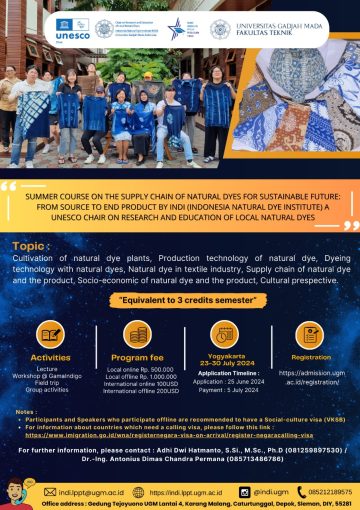
Until now, Indonesia still imports synthetic dyes for fabric and yarn containing azo, aromatic amino, naptol, direct, acid, base, and reactive groups, in huge capacities. The use of this dye has been banned since 1996 in Europe. Indonesia has a cultural legacy from its ancestors of using natural dyes, which are safe and beneficial for the body. Apart from that, Indonesia also has abundant natural wealth and biodiversity which are raw materials for making natural dyes.
On a national scale, the production and application of natural dyes can contribute to realizing the National Industrial Development Master Plan (RIPIN) 2015 – 2035. In RIPIN it is stated that the environmentally friendly dye industry for fabric and thread and leather, as well as the development of a green industry based on domestic raw materials, is a program for national priority industrial development. Listening to the contents of RIPIN 2015-2035, there are five (5) factors in National Industrial Development, namely: 1). local culture and wisdom; 2). Human resources, 3). Natural resources, 4). Environmentally conscious, and 5). Technological innovation. Efforts to develop industry and reuse natural dyes in Indonesia, when compared with the five (5) factors in National Industrial Development, are very strong and have potential in the first to fourth factors. The contribution of universities and research institutions in technological innovation really supports the development of the fifth factor, technological innovation, of the natural dye industry in Indonesia. In the global realm, market competitiveness rests on superior products that utilize environmentally friendly technology, and there is a growing movement towards sustainable fashion, organic, slow fashion, and an emphasis on returning to nature.
- Objectives and Outputs of the Summer Course
Objectives of Summer Course activities :
1) Increase knowledge and awareness of people throughout the world regarding the benefits of natural dyes for health and the environment;
2) Increase the number of national and international students and young people to appreciate, be aware and proud of natural dyes,
3) Develop a network and collaboration of natural dye lovers and users through interdisciplinary collaborative learning and research, to produce high-citation research and publications and superior innovation translations.
4) Provide a platform for individuals and organizations to learn ab
out the applications of natural dyes for textiles, food, and leather;
5) Achieve the goals of UNESCO Chair INDI in particular and INDI’s development master plan in general
After attending the “Capita Selekta Summer Course on Natural Dyes for Sustainable Development: From Upstream to Downstream by INDI (Indonesia Natural Dye Institute) – UNESCO Chair on Research and Education of Local Natural Dyes”, participants are expected to be able to:
1) Explain the benefits and contributions of natural dyes to human
health and environmental safety.
2) Identify and map sources of raw materials with an orientation towards the discovery or re-introduction of natural dye raw materials which takes into account the elements of availability (capacity), sustainability, non-damaging to the environment (Lestari), chemical, cultural, historical, theological, substantive and existing values.
3) Explain and select the process and technology for making natural dyes (in textiles, food, leather), as well as making natural color pigments for various products. This study and research are connected between one domain and another, such as management of natural dye sources, technology, economy, and community culture.
4) Explain and differentiate the technology of dyeing fabric, food, and leather with natural dyes. The technology here is both manual and mechanical, as well as to increase the quality of natural color strength in products by also paying attention to environmental, economic, political, social, and cultural aspects.
5) Formulate solutions to challenges in changing the culture of reusing natural dyes as substitutes for synthetic dyes.
6) Have the ability to learn and work collaboratively in an interdisciplinary and cross-cultural environment (setting).
- Time and Place
Date : 23 – 30 July 2024
Offline Place : Universitas Gadjah Mada (for the offline event)
Online : http://ugm.id/ZoomINDIUGM (for the online event)
- Format of Summer Corse
Summer courses will be implemented using a hybrid method (combining offline and online participation) to expose as many participants as possible. The offline event will be held at Gadjah Mada University, host of INDI UGM. The speakers will come from invited speakers who represent to present material regarding natural dyes from each field.
- Organizing Committee
The head of the Organizing Committee is Prof. Catur Sugiyanto (Faculty of Economics and Business, Universitas Gadjah Mada).
Application Period
Application submission is open until June 27th, 2024.
Contact Person
Adhi Dwi Hatmanto, S.Si., M.Sc., Ph.D (+6281259897530)
Dr. Ing. AntoniusDimas Chandra Permana (+6285713486786)
Email: indi.lppt@ugm.ac.id
Link Website

Recent Comments